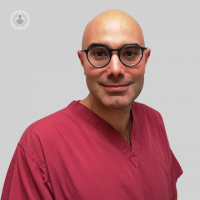Gallbladder Issues: A guide
Autore:In his latest online article Mr Naim Fakih Gomez gives us his exert insight into gallbladder issues. He explains the function of the gallbladder, the symptoms, the treatment and gallbladder surgery.

What is the function of the gallbladder and what happens if it is removed?
The gallbladder, a small organ positioned beneath the liver, functions as a reservoir for bile, a digestive fluid essential for breaking down fats in the small intestine. Bile is produced by the liver and travels through the primary biliary stream to the small intestine. During periods of fasting or when bile is not required for digestion, the gallbladder stores the excess bile.
In cases where the gallbladder is surgically removed, bile directly flows from the liver into the small intestine. Nonetheless, even without a gallbladder, the body can still efficiently digest fats.
What are the symptoms of gallbladder problems and how are they diagnosed?
The signs of a malfunctioning gallbladder can involve abdominal discomfort, nausea, vomiting, bloating, and jaundice. These indications may be linked to conditions like gallstones, inflammation of the gallbladder (cholecystitis), or obstructions in the bile duct. To accurately diagnose gallbladder problems, medical professionals may conduct various tests, including blood tests, ultrasound, CT scan, or MRI.
What are the treatment options for gallbladder problems?
The treatment approaches for gallbladder problems vary depending on the specific condition. Gallstones can be addressed through surgical removal of the gallbladder. In cases of gallbladder inflammation, treatment may involve antibiotics or surgery. When faced with a bile duct blockage, initial management can involve endoscopy, with the subsequent recommendation often being gallbladder removal to prevent recurrence.
What is the recovery process like after gallbladder surgery?
The recuperation period following gallbladder surgery, also referred to as a cholecystectomy, is contingent upon the type of surgery performed. Laparoscopic surgery, being less invasive, typically entails a shorter recovery time, whereas open surgery may require an extended hospital stay and recovery duration. After the procedure, patients might encounter mild abdominal pain or discomfort for a few days and may be advised to refrain from specific activities or certain foods for a temporary period.
Can a person live without a gallbladder and what lifestyle changes are necessary after its removal?
Individuals can lead a healthy life without a gallbladder, as the liver will continue to produce bile, which flows through the bile duct into the small intestine to aid in food digestion. Nevertheless, some people may experience mild digestive symptoms post-surgery, such as diarrhoea or bloating. They may need to make dietary or lifestyle adjustments to manage these symptoms for a period.
Over time, these symptoms often resolve as the body adapts to the absence of the gallbladder.
In rare cases, a small percentage of patients may require medication to control persistent symptoms in the long term. On the other hand, for patients whose gallbladder was non-functional due to blockage caused by gallstones, digestion may remain unaffected after surgery. A practical approach involves experimenting with various foods after surgery, avoiding those that might trigger symptoms to identify the most suitable diet for individual tolerance.
Mr Naim Fakih Gomez is a highly regarded bariatric and upper GI surgeon with over 15 years of experience. You can schedule an appointment with Mr Gomez on his Top Doctor’s profile today!


